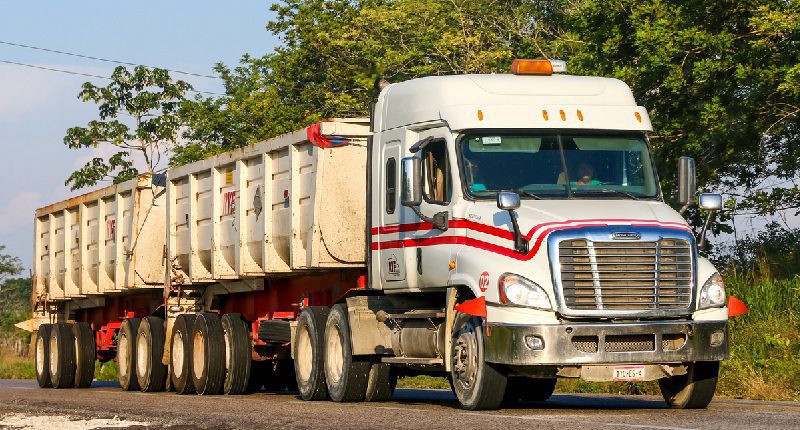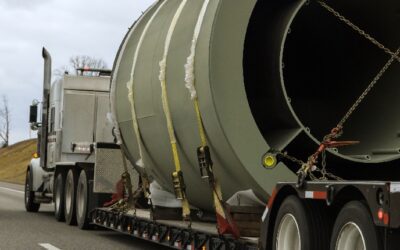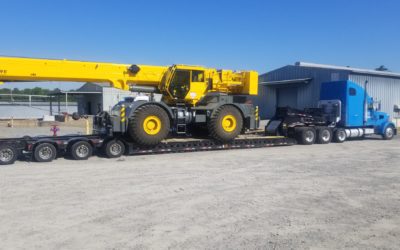What is a Pup Trailer?
You might not have heard the term “pup trailer” previously, but you have likely seen one on the road without knowing what to call it. Transport companies sometimes attach a smaller trailer to their standard-length trailer or dump truck to give them extra cargo capacity. The smaller trailer is the pup trailer, which provides several benefits for haulers and adds load capacity.
Here’s what you should know about this handy shipping option:
Why Do They Call It a Pup Trailer?
Pup trailers are a shorter semi-trailer type, typically 26 to 32 feet long, with a single axle, two axles, or a heavy-duty tri-axle. They get the name “pup trailer” because they appear to be on a “leash” behind the primary truck. The dead and live pup trailers are the two primary types, with the dead pup trailers having no power source, such as a pneumatic motor or hydraulic system. Instead, they depend on the pulling truck’s power and hoist to load and unload these trailers, while live pup trailers have hydraulic cylinders independent of the leading truck, enabling them to self-unload.
What Cargo is Best Transported in a Pup Trailer?
Hauling companies use dump trailers to transport soil, construction aggregate, and sand in the agriculture, manufacturing, and construction industries. They are often controlled with an electric motor or a hydraulic line from the dump truck and trailer to which they are attached using a pintle hitch system. An enclosed pup trailer is used with a traditional semi-truck to transport goods and products that must stay dry, such as home products.
Companies sometimes break down large machinery or heavy equipment that will not fit onto a flatbed-length trailer and use one or two pup trailers to haul them in one trip. Pup trailers also work well when a load does not fit in a single semi-trailer or dump truck, and their many configurations make them an ideal shipping solution. A pup trailer can take several forms: semi-pup, double-pup, etc.

Why Use Pup Trailers for Freight Transport?
Although the pup trailer’s size makes it seem like a disadvantage for efficient cargo hauling, they offer numerous benefits to transport companies and the general public:
Maximizing Payloads
Bulk cargo transporters use pup trucks to maximize their payload without compromising the handling of the dump truck in front. While a single pup is small in size and cannot carry a significant load, combining it with a traditional truck more than makes up for its small size. Incorporating one or two pup trailers is also helpful when a manufacturer buys a large piece of machinery that can be disconnected but will not fit into a conventional flatbed trailer.
Improve Productivity
Pup trailers allow heavy equipment hauling companies to deliver to multiple clients efficiently. They make planning and implementing LTL (less than truckload) trips easier since more routes now exist from which to choose. Transport companies can deploy them when they must move a partial load, reducing the number of trips they make while saving money and time. Even though they may not have the same payload rating as the standard dump truck trailer, pup trailers earn their keep by providing a means to ship an extra load that otherwise would have required a separate shipment. Because pup trailers are shorter, more routes are available for trucking companies to consider, helping them save time, making the logistics process more straightforward, and reducing costs.
Saving the Infrastructure
Pup trailers benefit the infrastructure by reducing the number of trucks on the road, thanks to the pups eliminating many separate shipments by maximizing payloads while ensuring truck control. Because the number of trailers on the roads decreases, the hours lost in traffic congestion should be significantly reduced. The number of accidents caused by trucks will also drop considerably.
Decreasing Emissions
Using pup trailers reduces emissions and exhaust fumes that harm the environment by reducing the number of standard trucks taking different routes at any given time. In addition to reducing air pollution, it reduces fuel consumption alleviating the pressure on natural resources.
Increasing Safety and Performance
For instance, dump trucks might use pup trailers equipped with an air-operated tailgate, spring suspensions, spring ride, air-ride suspensions, ABS, and LED lights to ensure safe driving and excellent vehicle performance.
What’s the Best Hauling Method for Pup Trailer Transport?
Although transporting a pup trailer on a flatbed trailer is an option, the various pups’ sizes and lengths often justify using a lowboy or RGN (removable gooseneck) trailer. The primary benefit of a lowboy trailer is its higher clearance, allowing haulers to move heavy equipment and machinery exceeding the DOT regulations on load dimension. However, hauling a pup trailer, forklift, wheel loaders, and rock wheels to a construction site will not breach the transport regulations.
The Bottom Line
Remember, pup trailers fill an essential need for transport companies, providing more cargo with fewer trips and extra flexibility and versatility for their schedules. The reduced length of pup trailers allows easy maneuverability in non-commercial areas unsuited for larger trailers. Pup trailers are the most common equipment with a lift gate affixed to allow unloading and loading at locations with no dock or proper freight handling equipment.
The professionals at Titan Worldwide offer an LTL pup semi-trailer designed to pick up and deliver local palletized freight. Our maximum freight dimensions are 22,000 lbs. weight capacity and 2,000 ft. cubed volume.
The pup trailer’s dimensions are (L)28′Width (W)102″Height (H)13′ 6″ with options for single, tandem, and tri-axle.
Talk to us today and start using our pup trailers to transfer your goods conveniently and efficiently!




